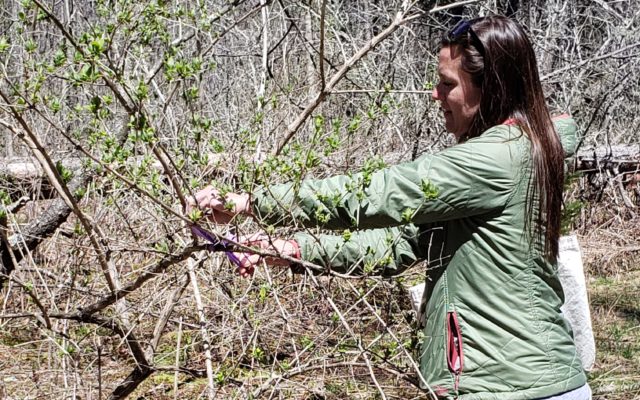
Beaver lodge and tiny island part of SeDoMoCha nature trail restoration project
DOVER-FOXCROFT — The woods near the SeDoMoCha School may be too swampy for construction, but a group motivated to enhance outdoor learning opportunities is rebuilding it as a living laboratory.
Thanks in part to a $7,350 grant from the Piscataquis County Fund of the Maine Community Foundation, a nature trail developed at the Dover-Foxcroft site nearly a half-century ago in an effort led by former teacher Dorothy Warren is in line for a makeover.
Plans call for the trail area — which includes a brook, tiny island, beaver lodge, rock wall, a building foundation left over from a former farmstead and abundant flora and wildlife — to be upgraded to improve the route for walking. The improvements will include eight learning stations and signage to help identify different natural elements.

Bangor Daily News photo/Ernie Clark
TRAIL RESTORATION — Sarah Robinson, executive director of the Piscataquis County Soil and Water Conservation District, identifies an invasive plant species during a tour of a nature trail near the SeDoMoCha School in Dover-Foxcroft on May 13. Plans call for the restoration of the nature trail, which originally was built during the 1970s.
“I think of it as a restoration to [Warren’s] first vision,” said Carolyn Clark, a literacy teacher at SeDoMoCha Elementary School who wrote the successful grant application with RSU 68 Superintendent Stacy Shorey. “I feel like she had a great way of putting together the trail, and we’d like to build on that.”
Warren was a longtime science teacher in Dover-Foxcroft who in 1969 conceived of the idea to create a nature trail just beyond the windows of her classroom at the former Morton Avenue Elementary School nearby. That building now houses the town office as well as several other offices and a gymnasium.
Over the next six years, volunteers young and old helped develop a network of trails that became known as the Outdoor Nature Laboratory.
Warren routinely took pupils outside during the fall and spring for an up-close study of the environment in the natural classroom.
The current quarter-mile trail spans from just beyond Mrs. Warren’s classroom — she died in 2008 at age 90 — to Harrison Avenue where the current SeDoMoCha complex is located.
While the trail has remained largely intact, it has been used just intermittently as a living classroom. That leaves current teachers like Clark and Chris Miller, a sixth-grade science instructor at SeDoMoCha who also oversees the school’s Outdoors Club, excited about the restoration’s potential impact on upcoming students.
“I think it’s the realest learning we can do, hands-on learning,” said Miller, whose students already utilize the trail and surrounding area for various nature-based activities. “I think when they are having fun and don’t realize they’re learning, they learn the most.
“This gets the kids out and teaches them about the natural resources that are in their backyard.”
The pursuit of the MCF grant coincided with the creation of the Facebook group “Restore Our Nature Trail in Dover-Foxcroft” in late January by Trisha Smith, a horticulture aide at the University of Maine Cooperative Extension of Piscataquis County.
“The trail is there, but when Trisha posted about working to make it more accessible to more people and rebuilding it and I knew we already had been trying to do that, it just felt like everything came together at the right time,” Clark said.
Several other groups are expected to contribute to the project including the Piscataquis County Soil & Water Conservation District and 4-H, though the pace of the project may be slowed by the current COVID-19 pandemic.
“I think it will get the community involved,” Miller said. “It will be nice to have a space where there will be interpretive stuff there and the community can go and walk. It will be a good space right in town for them, within walking distance.”
The project also is designed to be multi-generational by providing a nature-based alternative for recreational walkers, who already frequent school’s parking lots and connecting roads.
“It’s a resource for students but also a community resource where older folks can walk without worrying about ATVs and snowmobiles,” Smith said.
But the primary use for the nature trail will remain largely as it was five decades ago when Warren motivated the original outdoor laboratory effort.
“There’s a lot back there — it’s a great resource,” Miller said. “With Maine having ecotourism and so many people who work in the woods or as fishermen and guides, getting the kids out there gives them a chance to learn hobbies — and hobbies that can actually be used as a career at some point.
You can talk about stuff in a classroom, but when you get outside and actually implement what you’re learning, I think that’s deeper learning.”